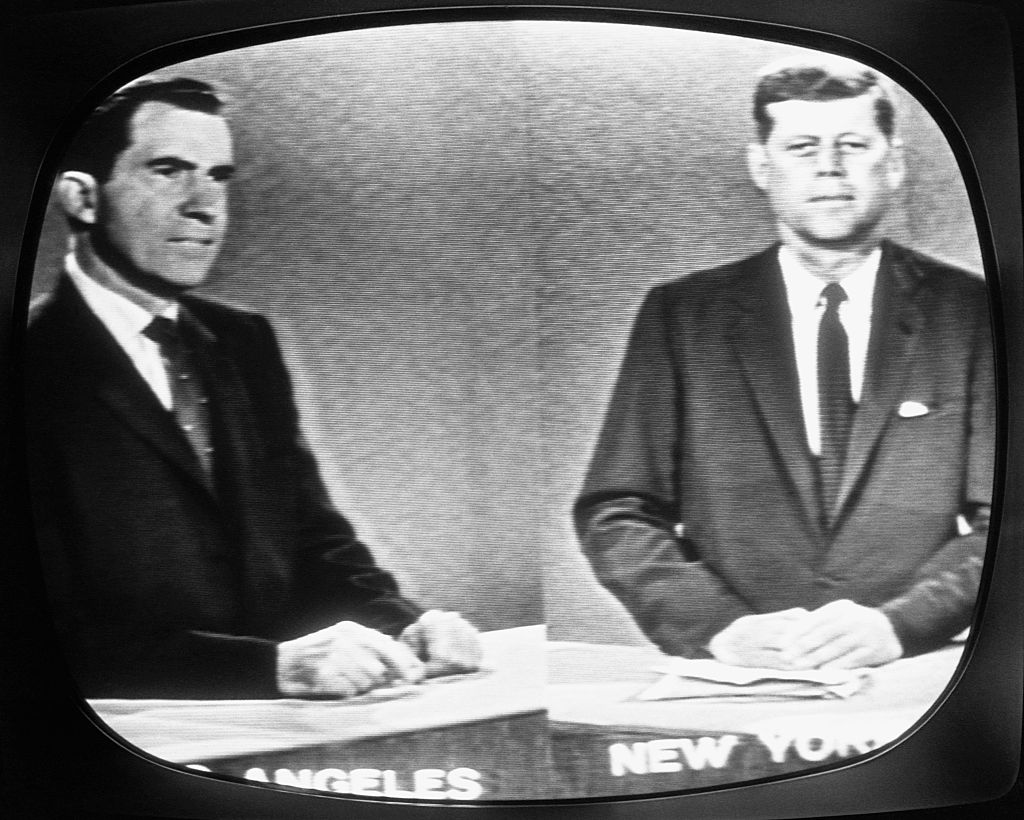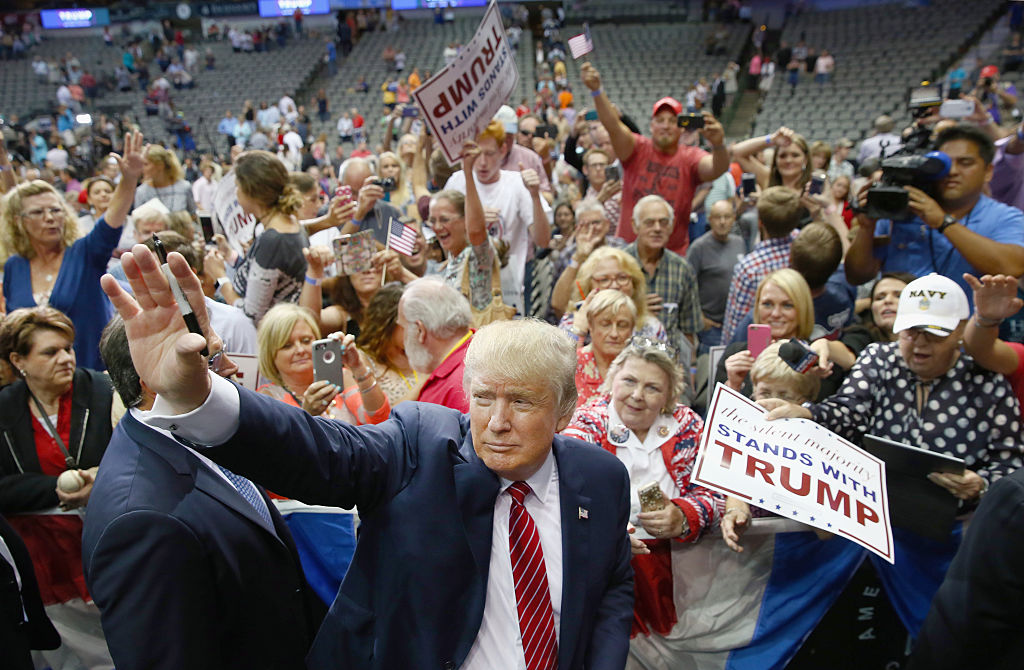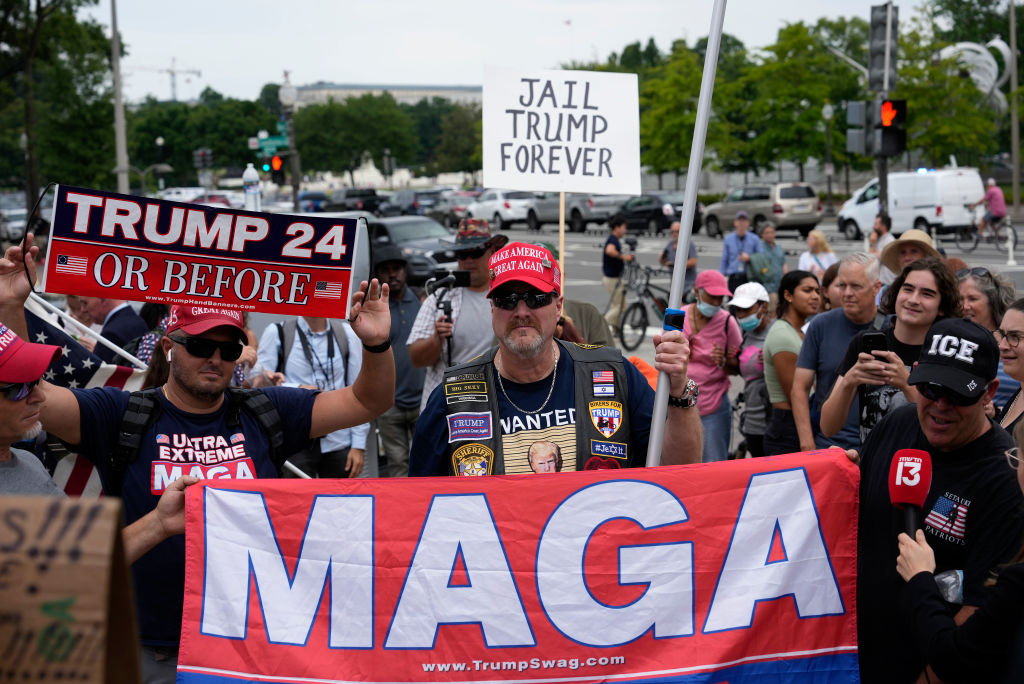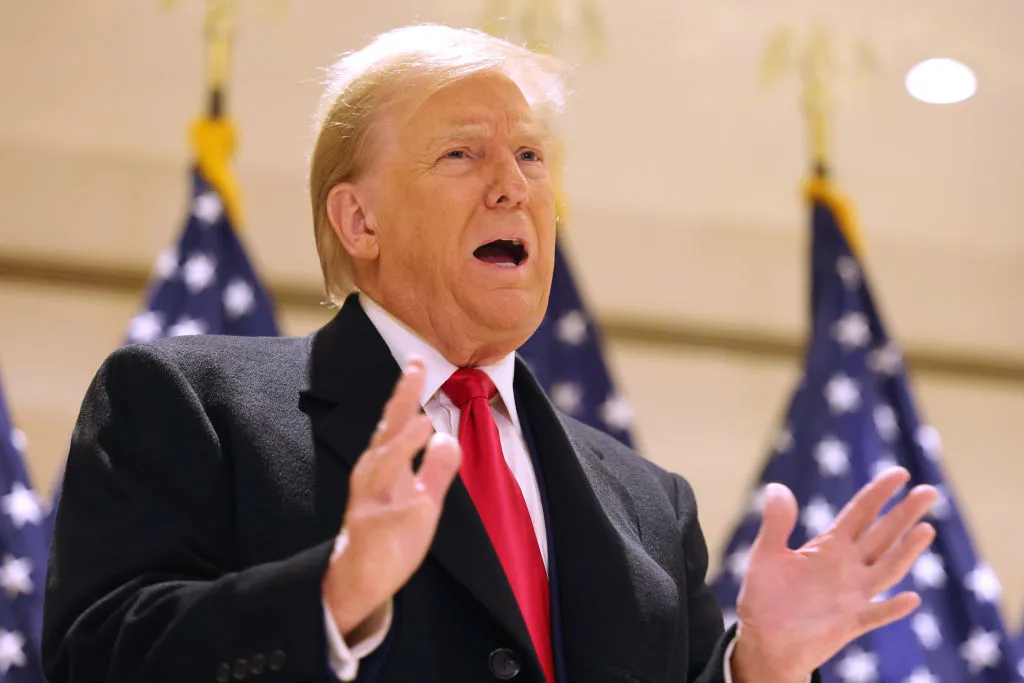It was hardly a surprise when Donald Trump said last weekend that he would not be participating in the televised Republican candidate debates. “New CBS POLL, just out, has me leading the field by ‘legendary numbers,’ he declared on his very own Truth Social platform. ‘The public knows who I am & what a successful presidency I had… I WILL THEREFORE NOT BE DOING THE DEBATES.”
In other words, I am winning so I do what I want. Trump’s arrogance puts many people off. It’s also compelling because he has a point. On the right of American politics — and, to a large extent, on the left and center too — there is only one story and it is Donald Trump.
We’re still eleven months from the Republican National Convention, when the party’s presidential candidate is confirmed. The primary elections don’t begin until January, yet they appear to be a fait accompli; more coronation than contest. Trump, the unstoppable force, is moving towards the immovable object that is the 2024 US presidential election.
Trump has his own movement, his own media networks, his own irrepressible brand
Desperate to add new drama, commentators have suggested that, by avoiding the debates, “Donald Duck” has given his would-be challengers a chance to “seize the spotlight.” That’s wishful thinking. Without Trump, there is no spotlight. Or as Michael Wolff, the bestselling writer about Trump, puts it: “It won’t matter much because nobody will be listening. It’s an ‘if a tree falls in a forest’ situation.”
According to one poll, 73 percent of Republican voters would have preferred that he had taken part in the first debate. But that’s just because Trumpvision is far more entertaining. So viewers headed to X — the platform formerly known as Twitter — to watch him speak exclusively to the former Fox News host Tucker Carlson, which aired minutes before the Fox News Republican debate began. Within hours of the interview appearing online, the pre-taped Trump-Tucker interview had been viewed 100 million times.
On Fox, the “Don-less” debate was a fiery affair, but it was all about fighting for the honor of second place. The various candidates took turns to attack Vivek Ramaswamy — a rising star in right-wing circles — but snap polls suggested he had won the debate. According to one survey, 28 percent of viewers thought Ramaswamy had performed best. He’s increasingly tipped not to become the Republican nominee, however, but as a leading contender to be Trump’s vice presidential pick. That says a lot about the state of the race.
Just in case anyone was thinking about alternative narratives, Trump announced on Monday (again on his Truth Social) that on Thursday he would be going to Georgia to be arrested following the latest indictment against him over his response to the 2020 election. “Can you believe it?” he asked impishly. Trump knows the answer: we can’t but we must. As the most famous man in the world, and now as a presidential candidate and as a suspect facing ninety-one criminal counts, Trump can guarantee that he will dominate the national conversation.

TV debates used to matter. Post-war America, the TV superpower, pioneered the form. The Nixon vs JFK debates in 1960 are often said to have been the moment when televisual culture took over the American mind. And while it’s true that party primary debates never pulled in the same viewing figures as the big showdowns between the two eventual nominees, they were perceived to matter. A boring debate was a good result for the leading candidate. A major gaffe could end a campaign. Think of Rick Perry’s infamous “Oops” moment in 2011, when the ambitious former Texas governor forgot which agencies he wanted to scrap.
Candidates knew that, however risky, they had to do the debates to show fealty to the all-powerful TV networks. Then, in 2015, Trump hijacked the Republican nomination process and the attention of the world. It’s not altogether an exaggeration to say that, in doing so, he upended reality.
Trump’s performances in the debates that year were mesmerizing. He was rude, appalling and a meme machine. In the CNN one, he stood next to Jeb Bush, brother of the last Republican president, and ridiculed him. In the Fox one, he had a now infamous clash with Megyn Kelly. “You’ve called women you don’t like fat pigs, dogs, slobs and disgusting animals,” said Kelly. “Only Rosie O’Donnell,” Trump interrupted, referring to a famously rotund TV star.
The news channels spent days dissecting every moment. TV hacks would feign horror as they tried to piggyback on Trump’s ability to make headlines. They looked ridiculous. He destroyed all pretense that news television was distinct from showbusiness. It was just hollow entertainment.
Today, Trump doesn’t need the TV networks. He’s not the novelty he was in 2015, but he has his own movement, his own media networks, his own irrepressible brand. He is the message. He is the medium.

“Trump has always understood branding, I would argue better than anyone,” says Roger Stone, the political strategist and Trump confidant. “Candidates normally have to go on television and say, ‘This is who I am and what I stand for.’ By 2015, the Trump brand was so strong that he could skip the first part. Today, the brand is so powerful that he can pick and choose where he wants to go on alternative media and people will follow him there.”
To understand how Trump, a TV addict himself, achieved this dominance over the old news media, it helps to look back at what happened to American television in the past few decades.
In 1987, the Federal Communications Commission abolished the so-called “fairness doctrine” of 1949, which compelled broadcasters, as a condition of their license, to cover the news and present opposing viewpoints on controversial issues. With the advent of cable, the mega TV networks turned their news output into vast money-spinning operations. Without the legal obligation towards “fairness,” news programming spread across different channels, even as the format remained largely the same.
By the turn of the twenty-first century, news had become far more obviously entertainment — and something of a joke. In fact, Jon Stewart’s The Daily Show, a satire on Comedy Central, was one of America’s most popular news shows. At the same time, Rupert Murdoch’s Fox News turned into a hugely profitable behemoth by giving conservative viewers what they wanted.
This coincided with the rise of digital television and the internet boom, which disrupted everything and made news shows seem hopelessly outdated. Attention spans shriveled; audiences fragmented. By the mid-2010s, all that mattered was the viral moment: somebody getting “owned” or”‘owning” someone. It made people laugh.
How does every criminal indictment against him only make his poll ratings improve?
That’s where Candidate Trump, the greatest joke of all time, came in. He bounced between the TV networks and Twitter all the way to the White House. As president, he kept on carrying on: infuriating self-important journalists who could not accept that their audiences were not really engaging with, let alone caring about, what they said.
Today, Trump’s critics profess themselves incredulous: how can a man facing four criminal indictments in four different states still be popular enough across the country to win a major party nomination? Worse, how does every indictment only seem to make his poll ratings improve?
These critics forget that, whatever the merits or not of the charges against Trump in relation to hush-money payments, pilfered classified documents, or even the riot on January 6, a large number of Americans just don’t want to believe them. Voters remember 2016 and the first years of the Trump presidency. They recall how so much of the media obsessed over “Russiagate” — the conspiracy theory that Vladimir Putin had somehow hacked American democracy and now controlled the president of the United States.
The multifaceted legal campaign against Trump today may prove to be different — we’ll have to wait and see — but to millions of addled media consumers, it sounds the same.
Moreover, the media landscape has altered once again. The “social internet” is being transformed; Facebook and Twitter are no longer the public square.
And sure enough, Trump has changed too. He no longer uses Twitter/X, even though its owner, Elon Musk, has unbanned him. For now, he’d rather just use the platform as a kind of broadcast station for interviews. Trump and his movement talk to each other on Truth Social and a multiplicity of other smaller platforms. It’s more subterranean than social, which makes it ever harder for outsiders to understand. We only have the polls to show that Trump’s movement is big and it is out there. The CBS survey Trump was bragging about shows him on 62 percent, far ahead of his nearest challenger, Ron DeSantis, on 16 percent. Last year, after the midterm elections, the old media, especially Fox News, leapt on DeSantis, the Florida governor, and hailed him as Trump’s natural successor. That didn’t work.
Everybody knows that Trump’s support is more than large enough to win the Republican nomination. But can he win back the presidency?

President Joe Biden and the Democrats, who operate in their own alternative media universes, are betting the White House that he can’t. They regard Trump’s nomination as the best way to guarantee their party a second term — and it’s easy to see why. Trump remains a hugely unpopular figure; 56 percent of Americans have an “unfavorable” opinion of him (for Biden, the number is 54 percent). His movement hasn’t really won an election since 2016. In 2018, 2020 and 2022, Trumpism fell short at the ballot.
For now, Trump’s legal problems appear to be making him more popular. Yet it’s also clear that the criminal trials could overshadow next year’s campaign. It’s hard enough for a free man in his prime to fight a presidential election, let alone a seventy-seven-year-old facing almost 100 different charges.
Then again, Trump’s campaign likes nothing more than to trumpet his apparently superhuman energy levels. He’ll delight in contrasting himself with the frail Biden, who increasingly seems a ghost of his former self.
“By any logic, Biden should win,” says Wolff. “The problem is, in an election, it’s just two guys and that means anything could happen. Logic might not matter. Biden could fall over again at just the wrong point. The whole business could be decided by an exogenous event in the last two weeks. We just don’t know.”
We don’t know, and of course everything could change. With two old men vying for power, death may well intervene. As things stand, however, there is a significant chance that Trump could be back in the White House by January 20, 2025 — and reality will be scrambled all over again. Stay tuned.
This article was originally published in The Spectator’s UK magazine. Subscribe to the World edition here.






















